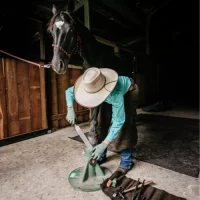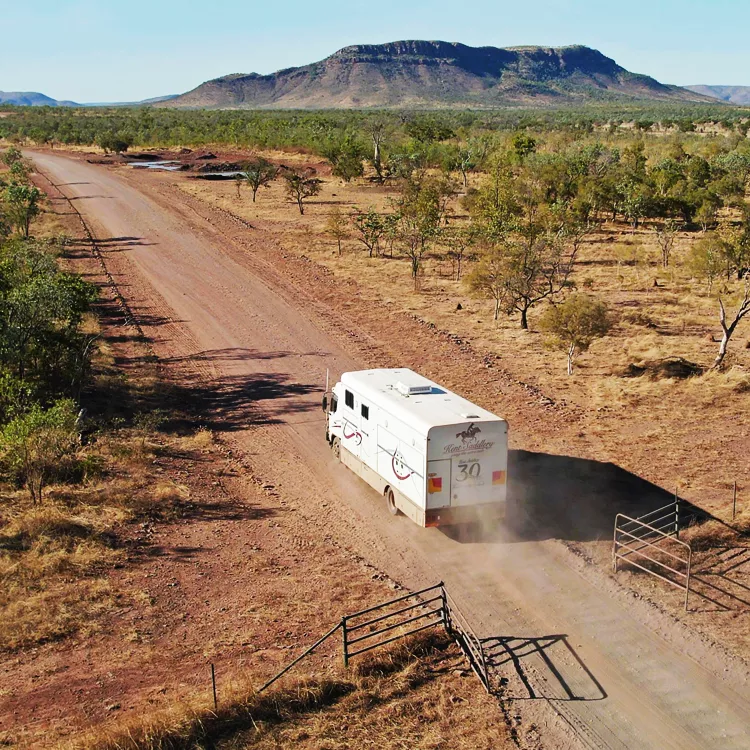Ethleen Burnett – Mellish Park Station, Western Gulf QLD
Sadly, Ethleen passed away just a month short of her 94th birthday on 12 October 2015.
“In the best of times”
Ethleen Burnett was born in Charters Towers, Qld in 1921. “I’m ancient!,” she chuckles, and for the Webber family, “Boarder”, as she’s affectionately known, is bonded to and loved by three generations of Webbers.
In 2014, Ethleen was living with Al and Bev Webber at their property “Mellish Park” near Gregory in Queensland’s Gulf country. She and Bev’s mother, Eileen Bailey, reside at Mellish Park and at ages ninety-three and ninety-seven respectively, a grand number of years have accumulated.
Ethleen’s childhood was happy, full and carefree. Her father, Egerton Burnett (Known as EG) managed Cowan Downs (Gulf Country), Linda Downs (Qld Channel Country) and Inverleigh (Qld Gulf). He then bought Cowan Downs.
“When I was five years old,” she remembers, “my parents nearly went broke in the 1926 drought and Dad returned to a management position at Lorraine Station in Queenslands Gulf.” The next seven years are etched vividly in Ethleen’s memory; the narrative creating a mental and emotional picture of a lifestyle which she loved.
“My second name is Egerton,” she informs. “I had three sisters a lot older than me and two younger brothers. My sisters used to go to dances and parties … I didn’t. I was too young then.”
She describes Lorraine Station as “a big place … we went swimming and riding … we had a pony each … it was just great you know.”
The memory is clear. “There was a big staff … no shortage. If one person left, another one would come on the mail the next week. There were usually about seven ringers in the camp; there was a book keeper, a Chinese cook and a gardener all the time. The river banks were terraced and planted with vegetables. We pumped water into ships’ tanks buried in the ground and the Chinese cook/gardener would fill two buckets and carry them on a pole; one on each side. They’d walk along the vegetable rows watering each side… like two watering cans.”
Ethleen continues and the mental visual expands. “There were always aboriginal girls helping around the house … doing laundry, cleaning, ironing and three or four “boys” (aboriginal men) as station workers; along with their wives and children. We always had a cow boy to milk the cows (and do other chores). Wages were not that much those days … every station was like that then.”
Life on Lorraine was a family affair. “Dad was always out (from the station complex). My cousin, Jim Burnett did all the droving for my father, taking cattle from Lorraine to the railhead at Kajabbi. We children used to go fencing with Dad… take our lunch and play while he worked.”
Those first seven idyllic years ended when Ethleen had to leave to attend boarding school. “It nearly broke my heart when I left Lorraine, but every holidays we’d be back and everyday we’d be out and about doing all the things we enjoyed and helping with the mustering.”
A new phase of Ethleen’s life began when she left school. Her sister Eileen had married Frank Webber and they were living at Nardoo Station near Gregory.
Eileen was a semi invalid and Ethleen, back at Lorraine and looking for a new direction, shifted to Nardoo as cook/girl-Friday.
“I was there for sixty-four years,” she smiles. “I could do everything… start engines for pumping water, drive all the vehicles, including the Ferguson tractor. If they were shorthanded, I’d go mustering… horses or cattle. It was just a good life.” The “good life” included some experiences which question that description.
“One Winter, we had to shift cattle from Nardoo to Burketown for agistment. I went to help out and the first day we made it to just through the boundary to Augustus Downs. It was freezing cold… I was so stiff and sore I could hardly walk!”
Horses were a fact of life at Nardoo and one time when Frank Webber was away for several days, one of the stallions became “stuck” in water up to his knees. “It was boggy and I was scared of that horse,” Ethleen admits. “He wouldn’t, or couldn’t get out, so for three days I managed to float feed to him in a tub with a rope attached. Ethleen’s commitment to helping the hapless animal came to a satisfactory, if not disconcerting conclusion. She laughs. “When Frank came back he went down there and led him straight out! Couldn’t believe it.”
Immediately serious, she adds, “There were tough times and the Webbers were not wealthy landowners. There were droughts… every day pulling out bogged cattle. One Christmas day at Boggy Lagoon the cattle were dying… it was bad. There were no radios… and often it was Eileen and me and a black girl the only ones in at the station… checking the bores and feeding the horses. Frank and two black fellas… very good men, and loyal… they’d be out mustering.”
During the 1940’s and 1950’s Frank and Eileen’s three sons were born. John (who died in 2012), Alan, and Ege grew up with “Boarder” and she was a key person in their lives. “I remember one time when Al was about ten or eleven… he was always keen on horses,” Ethleen recalls. “We had to train these horses. The Webbers always used to train their own race horses and every morning we’d go out and gallop them around the course and take them for a walk. Each day we’d take them on exactly the same track and one day I said to Al, “How about we go this way? …it’s a bit shorter.” “No Boarder!” Al retaliated, “Dad said we had to go THAT way and that’s the way we’re going!”
Voicing affection for and pride in Al’s achievements, Ethleen concludes, “Anyhow, we went to Normanton with those three horses and won five races. That was pretty good for Al… for a ten year old… training those horses.”
The races were a focal point in the Gregory community… and beyond; …highlights in Ethleen’s life. Not only the event itself, but also the lead up and followup activities.
“Gregory, Normanton, Burketown, Cloncurry,” she recites. “We’d ride the horses over and back… never trucks.” There’s a post script. “The first time they took the horses on a truck it took them half a day to load two horses!”
“Anyhow, those days at the races we used to camp on the river and we had to build a fence around the camp, otherwise the horses and cattle would come in and they’d chew your dresses!” Wistfully, she recalls, “There were dances every night… Oh, we used to have fun! Now days, after the last race, everybody’s gone.”
“One year,” she brightens, “the Gregory hall blew down. That didn’t matter; we put forms all around on the ground, just like in the hall and some of the young fellas, …they were half full and kept tipping the forms over backwards!”
“Another time, there was a whole week of dancing at the Normanton races. Every night, raising funds for different charities. There were two full days of racing, fifteen horses.” The events were sometimes embellished with drama. “At one of the race meetings,” she recalls, “somebody had poisoned one of the horses.The stock inspector from Gregory was able to cure him and then that horse went on to win a race following.”
She sighs. “Oh Yeah. They were good years.” …Good years that reflected socially different ways.
“Back then, we used to visit with our neighbours… ride over to Augustus (Downs) for the day. Every New Years Day we’d go to the “Fourteen Mile”… always a picnic on New Years Day… and we’d get together with our neighbours from Augustus and Lorraine. Sometimes, when the river was in flood, we’d have to swim across. Frank was a good swimmer and we’d put all the food in a wash tub and he’d swim it across. We’d play cricket and swim and enjoy the food. It was good.”
Not so good are memories of six weeks without mail. The Wet season floods meant that roads to Nardoo were cut off. For the duration of “The Wet”, there was the underlying knowledge that in an emergency, communication and access to immediate help was almost nonexistent.
That was to change.
1945, the year John Webber was born, brought the advent of wireless/radio telephones and peace of mind for the cattle station community… a significant point in the history of the Outback.
Mellish Park was bought, sold and bought again by the Webbers, and Ethleen cherishes memories of time spent at ‘Mellish’ when the muster was on. “I used to love coming up here,” she shares. “We’d have to get across Scrubby Creek and Firey Creek… always got bogged at those two. Took all day to get here (a distance of 94km’s). The young ones loved coming here to muster and chase the wild bulls… there were a lot of wild bulls in this country.”
In 1984 Ethleen’s forty-four years of a Nardoo lifestyle absorbed and loved, ended, and she ‘retired’ and moved to Brisbane. However, her enthusiasm and zest for living remained unchanged and she involved herself in other pursuits, including membership in the Royal Flying Doctors Service Auxiliary. She enjoyed the shift from the country to the city and laughingly complains, “I’d still be there if I could walk!”
In 2012 she was welcomed back by Al and Bev and family; …it was a return to country and family she’d known and loved for all those years. The situation is now reversed. The family Boarder cared for, so many years ago, are now caring for her and she and Eileen are grateful – particularly for Bev’s generous attention. Ethleen is able to participate in the lives of Al and Bev’s children, and their children, and she enjoys being a part of their achievements. That’s the here and now and she’s content.
She is however, convinced that the years of her youth “were good years,” and quietly concludes, “We lived in the best of times.”
Article by Helen Kent
“Ethleen Burnett, Mellish Park Station, Western Gulf, Qld, 2014”
Image captions:
1) Ethleen Burnett, 2014
2) Burnett Family
3) Lorraine Station Homestead, 1930s
4) Ethleen collecting mail from the mailbox six miles from Nardoo Station
5) Ethleen Burnett, Boarding School, 1936.
6) Nardoo Station
7) Ethleen dressed for the races, 1941
8) Nardoo race horses
9) Picnic at Fourteen Mile, Leichhardt River
10) Looking along road towards house
11) How we got our mail in 1950’s flood
12) Ethleen, early 20s, Ready for mustering















